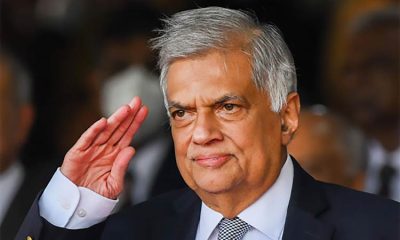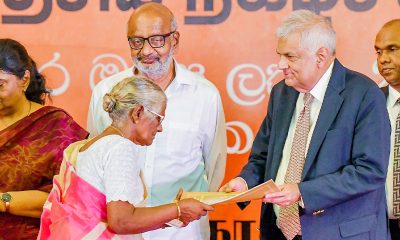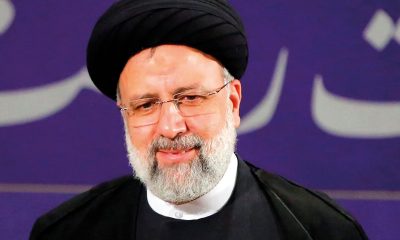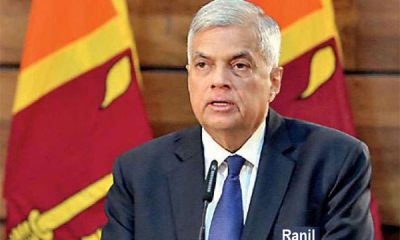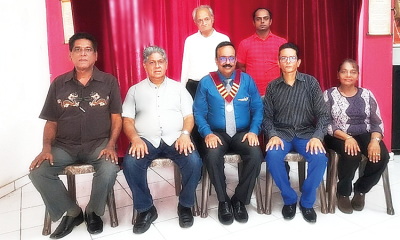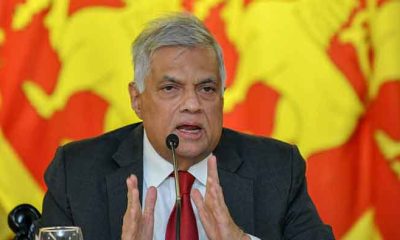Features
Indian model as wayforward
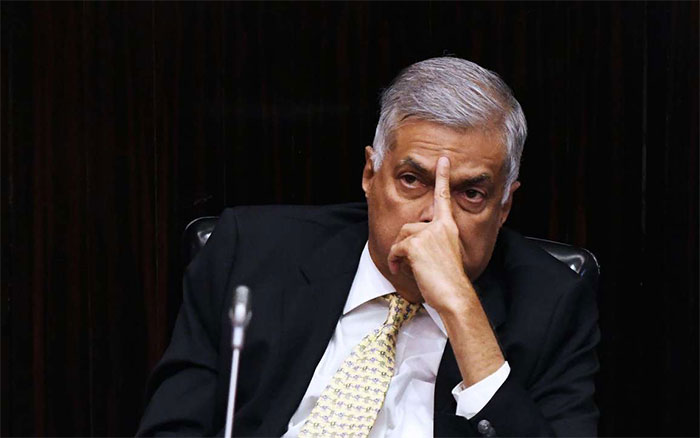
By Jehan Perera
President Ranil Wickremesinghe’s statement that district committees can be considered as part of the solution to the vexed problem of power sharing between the ethnic communities has caused a considerable furore in the Tamil community. It came as both a shock and a disappointment as the president has also been speaking about fast-tracking the national reconciliation process. The president said he is ready to reintroduce District Development Councils when former president Maithripala Sirisena proposed setting up of district councils under the provincial councils as a cost cutting measure. “Former President, I listened to your comments on District Development Councils and I am ready to do it,” the President is quoted as having said. Subsequently, the president’s media unit clarified that the President meant that the District Development Committees (DDCs) will be established within the Provincial Councils.
The president’s media unit further elaborated that the DDCs would provide a platform for coordination between the government, the provincial councils and the local governments for all executive decisions. It also said this will ensure the process is not duplicated and will reduce financial wastage. The concept of the district as the unit of devolution was tried before in 1981 by the president’s uncle, the late president J R Jayewardene during whose period the government established DDCs to be part of the solution to the ethnic conflict that was getting worse by the day. The Sri Lankan security forces had been ordered to control the growing Tamil militancy. The security forces were armed not only with guns but also with the Prevention of Terrorism Act which was abused then as it is abused today though to a much greater extent then, than it is now.
The memory of the brief period of the DDCs is an unhappy one to the Tamil community. The elections to the DDC were contested by the ruling party, the UNP, to which the president belongs. The government’s attempt to rig those elections and win them at any cost led to the catastrophic burning of the Jaffna Public Library in 1981. This seat of learning was one of the most sacrosanct institutions of Tamil civilisation that symbolised the high quality of education in the north of the country that was the envy of other parts of the country. It is therefore not surprising that the president’s media unit was quick to deny the very negative inferences made with regard to the president’s speech.
REINTERPRETING WORDS
The president’s media unit can be relied upon to accurately portray the president’s cryptic remark with regard to his willingness to resuscitate the district council system. However, the very idea of creating a complex platform for coordinating the central government, provincial councils and local government bodies for all executive decisions seems to be a difficult task. It runs the real risk of killing any possibility of decision making through a multiplicity of committees. Coordination within one level of the government is difficult enough. Coordinating between multiple levels will be even more difficult. There have been issues when two drivers sit at the wheel. Who does the Government Agent in a district report to as he also serves as the District Secretary? What is the protocol when a central deputy minister and provincial minister attend a formal meeting?
The questions noted above have been raised in the past and many remain unresolved and making further units of devolution will be confusion compounded. The irrelevance of the proposed district committees to the solution of the ethnic conflict can be seen by another problem. The provincial councils, which were formulated to be the solution to the ethnic conflict, and to represent the wishes of the people of each province, do nothing of the sort at the present time, as they are non-functional where people’s representation is concerned. For the past four years, the provincial councils have only been administrative bodies run by a presidentially appointed governor who can act, and does act arbitrarily, without consulting the people of the province. During this period, elections to the provincial councils have not been held. Far from being institutions of devolved power, the provincial councils now represent the centralised power of the state, both unfortunately and perniciously.
The ability of the government to neutralise the provincial councils by the undemocratic method of not permitting elections to be held for 4 years gives impetus to the Tamil community’s rejection of them. The provincial councils were brought into existence in 1987 as the main democratic part of the solution to the ethnic conflict. They were meant to provide the people of each province with the power to decide on locally relevant matters. But this right has been denied to them. This would be the main reason why the demand for federalism is once again coming to the fore. In a landmark judgement the Supreme Court in August 2017 with Chief Justice Priyasath Dep presiding ruled that “Advocating for a Federal form of Government within the existing State could not be considered as advocating Separatism.” The court dismissed a petition that ITAK (or Federal Party) had, as one of its “aims” and “objects” the establishment of a Separate State.
POSITIVE RESPONSE
The TNA which is the largest Tamil party (with ITAK as its major component) has responded positively to the president’s announcement that he intends to seek a solution to the ethnic conflict by the 75th anniversary of Independence. They have said that they will seek a solution on the basis of federalism. Their spokesperson M. A. Sumanthiran has pointed out that there are more than 25 countries in the world which have federal system and they are very much united, and contain over 40 percent of the world’s population. The United States, India, Switzerland and Malaysia are examples of federal states. The key feature in a federal state is that the government will not be able to change the way a provincial council is governed. Certainly, the government will not be able to arbitrarily postpone elections to a provincial council for four years and then run it centrally through a governor of its own choice.
On the other hand, from the time that the Tamil polity has asked for federalism, beginning in the 1950s, the Sinhalese polity has rejected it as being injurious to the country’s national sovereignty and security. There is misapprehension that federalism might be the first step to secession. The examples of the former Soviet Union and Yugoslavia are given as examples of federal states that broke up on the lines of their federal units. The Sinhalese position is that a unitary form of government would protect the country from being divided in this manner. However, even unitary states have been divided if they did not manage their ethnic relations in a constructive manner as was the case in Sudan (which divided into South Sudan) and Serbia (Kosovo). The enlightened reasoning and decision of the Sri Lankan Supreme Court in 2017 needs to be explained to the political parties and to the general population.
The 18th century English poet Alexander Pope wrote “For Forms of Government let fools contest whatever is best administered is best.” Just across the seas from Sri Lanka the world has a good example of a diverse and huge country that has held together as one and is now getting stronger and stronger, both in terms of its economic might, but also its international stature. The Indian form of government is neither wholly federal nor wholly unitary, but can take on aspects of either as the situation demands. In times of peace it is federal, in times of stress it can become unitary. This was the solution that India and Sri Lanka agreed to in the Indo-Lanka Accord of 1987 and which was distorted in the 13th Amendment. Recently in parliament, former president Mahinda Rajapaksa went one step forward to say he was for discussions on 13th Amendment plus. India has been Sri Lanka’s best saviour at the present time in terms of the economic crisis, giving Sri Lanka far more than other countries. With India’s political support to a political solution based on its own learning and experience, a viable solution can be found and Sri Lanka can forge ahead as a truly united nation to economic development.
Features
‘Silent Majority’ abandoned to Long-suffering in regional conflicts

 With reports emerging that India has attacked some ‘sites’ in Pakistan and Pakistan-administered Kashmir, the question could be posed whether the stage has just been set for yet another costly India-Pakistan military conflict. Sensible opinion in South Asia could only hope that wise counsel would sooner rather than later come to prevail on both sides of the divide and that they would draw back from the brink of full-scale war.
With reports emerging that India has attacked some ‘sites’ in Pakistan and Pakistan-administered Kashmir, the question could be posed whether the stage has just been set for yet another costly India-Pakistan military conflict. Sensible opinion in South Asia could only hope that wise counsel would sooner rather than later come to prevail on both sides of the divide and that they would draw back from the brink of full-scale war.
The states concerned ought to know fully well the possible wide-ranging weighty consequences of another regional conflict. It should be plain to see that it would benefit none in the two theatres of confrontation, most particularly the relevant publics or the ‘Silent Majority’.
In fact, in connection with the mentioned initial military attacks, the Pakistani side has gone on record that some civilian lives have been lost. Such losses could burgeon in the event of full scale hostilities. These costs could of course be staggering and unimaginable in the event the nuclear option is resorted to by the sides, going forward.
Accordingly, the hope of the peace-loving world-wide is likely to be that India and Pakistan would give negotiations a chance and resolve their differences peacefully. It would be in the best interests of the world for the champions of peace to join their voices to that of UN chief Antonio Guterres and call on the sides to negotiate an end to their differences.
The utter helplessness and misery of the people of the Gaza ought to drive home afresh the horrors of war. Currently the news is that the Gazans are literally starving to death. Food and other essentials provided by UN agencies are reportedly being prevented by Israel from getting to the hapless people of Gaza. So dire is their situation that concerned quarters are calling on the compassionate worldwide to provide the Gazans with food, water and other essentials voluntarily. This SOS would need to be heeded forthwith.
Accordingly, it could be inferred that most formal arrangements, including those that are generally under the purview of the UN, geared to providing emergency humanitarian assistance to the needy, have, for all intents and purposes, been rendered ineffective in the Gaza. The UN cannot be faulted for this state of things; rather, Israel should be held accountable in the main for it.
The matter of accountability is central to the dramatic slide into lawlessness the world has been experiencing over the past few decades. As could be seen, International Law is no longer fully applicable in the conflict and war zones of the world because it is not being adhered to by many state and non-state aggressors. That the UN is hapless in the face of such lawlessness is plain to see.
We have of course the Middle East wherein International Law has fallen silent for quite a while. How could it be otherwise, when Israeli aggressions are being winked at by the US, for which the policy of backing Israel is almost sacrosanct?
Moreover, under President Donald Trump, it is difficult to see the US changing policy course on the Middle East. Trump made vague promises of bringing peace to the region in the run-up to his reelection but has done nothing concrete by way of peace-making. Consequently, complete lawlessness prevails in the Middle East. US policy towards Israel counts as another example of how the self- interest of US central administrations blinds them to their international obligations, in this case Middle East peace.
However, the commentator could be criticized as being biased if he holds only Israel responsible for what has befallen the Middle East. It has been the position of this columnist that Israel’s security needs should be taken cognizance of by its state and non-state adversaries in the Middle East and acted upon if the basis is to be laid for a durable Middle East peace. Inasmuch as Palestinian statehood must be guaranteed, the same should be seen as applicable to Israel. The latter too enjoys the right to live in a secure state of its own, unopposed by its neighbours.
The Ukraine of today is also sad testimony to the ill consequences of powerful, aggressor states wantonly disregarding International Law and its obligations. Nothing could justify Russia in invading Ukraine and subjecting it to a condition of Longsuffering. Clearly, Ukraine’s sovereignty has been violated and such excesses go to the heart of the current state of ‘International Disorder’. Of course the same stricture applies to the US in relation to its military misadventures in Afghanistan and Iraq, to name just two such modern examples.
There is no ducking the fact, then, that civilian publics in the mentioned theatres of war and outside, are being subjected to the worst suffering as a consequence of the big powers’ self-aggrandizement schemes and military misadventures. Longsuffering becomes the tragic lot of the people who have nothing to do with such unbridled power ambitions.
One would not be exaggerating the case if he states that civilian publics count for almost nothing in the present ‘International Disorder’. Increasingly it is becoming evident that from the viewpoint of the big powers and authoritarian governments the people are of little or no importance. Considering that self-aggrandizement is of the paramount interest for the former the public interest is coming to be seen as inconsequential.
Consequently, not much of a case could be made currently for the once almost reverentially spoken of ‘Social Contract’. For, the public interest does not count for much in the scrambles for power among the major powers who are seen at the popular level as the principal history-makers.
It is in view of the above that much is expected of India. Today the latter is a ‘Swing State’ of the first importance. Besides being a major democracy, it is one of the world’s principal economic and military powers. It possesses abundant potential to help to put things right in international politics. If there is one state in Asia that could help in restoring respect for International Law, it is India.
Considering the above, India, one believes, is obliged to bear the responsibility of keeping South Asia free of any more long-running, wasting wars that could aggravate the material hardships and socio-economic blights of the region. Thus, India would need to consider it imperative to negotiating peace with Pakistan.
Features
Memorable happening … Down Under

 Under the Global-Ise Australia Advanced Sports Development Programme, a delegation of 15 swimmers from Lyceum International School, Wattala, had the remarkable opportunity to train and experience high-performance sports development in Melbourne, Australia.
Under the Global-Ise Australia Advanced Sports Development Programme, a delegation of 15 swimmers from Lyceum International School, Wattala, had the remarkable opportunity to train and experience high-performance sports development in Melbourne, Australia.
The 10-day programme was carefully curated to offer intensive training, educational exposure, and cultural experiences for the young athletes.
The swimmers underwent specialised training through Swimming Victoria’s elite programme, held at some of Melbourne’s premier aquatic facilities.

Visit to Victorian Parliament
Each day began as early as 5:00 a.m. and continued until 7:00 p.m., ensuring a rigorous and enriching schedule that mirrored the standards of international competitive swimming.
Beyond training, the programme offered a wide array of experiences to broaden the students’ horizons.
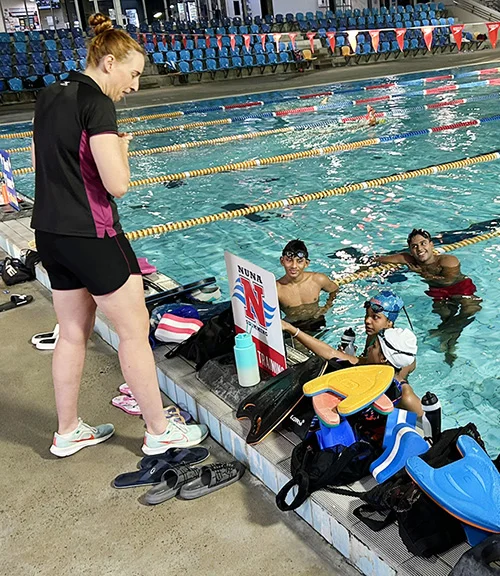
Morning training
The tour group explored iconic landmarks such as the Victorian Parliament and the Melbourne Cricket Ground (MCG), and enjoyed shopping at Chadstone – The Fashion Capital. They also experienced the natural beauty of Victoria with visits to Yarra Valley Chocolaterie & Ice Creamery, and Cardinia Reservoir Park, where they observed kangaroos in their natural habitat.
An academic highlight of the tour was the group’s exclusive visits to three of Australia’s leading universities: the University of Melbourne, Monash University, and Deakin University. These visits aimed to inspire students and showcase the vast educational opportunities available in Australia.

Checking out the scene at Yarra Valley Chocolaterie & Ice Creamery
As part of the cultural immersion, Global-Ise hosted a traditional Australian BBQ at the Tim Neville Arboretum in Ferntree Gully. The students also enjoyed a variety of diverse culinary experiences each evening, further enriching their understanding of local and international food cultures.
The tour concluded with a celebratory dinner at the Spicy Wicket Restaurant, where each participant received a presentation in recognition of their involvement.

Enjoying an Aussie BBQ for lunch
The evening was made especially memorable by the presence of Pradeepa Saram, Consul General of Sri Lanka in Victoria.
Global-Ise Management—Ken Jacobs, Johann Jayasinha, and Dr Luckmika Perera (Consultant from the University of Melbourne)—did a magnificent job in planning and the execution of the advanced sports programme.

Coaches from Sri Lanka presenting a plaque to Global-Ise Management team
Ken Jacobs (centre), Johann Jayasinha, and Dr Luckmika Perera (on the right
Features
Bright, Smooth Skin

 Hi! How’s the beauty scene keeping with you?
Hi! How’s the beauty scene keeping with you?
Phew, this heat is awful but there is nothing that we can do about it.
However, there are ways and means to take care of your skin and I will do my best to help you in every way I can.
Well, this week, let’s go for a Bright, Smooth Skin.
Gram flour (also known as besan) is a traditional skincare ingredient known for its:
* Natural exfoliating properties.
* Ability to absorb excess oil.
* Gentle brightening and tan-removal effects.
* Suitability for all skin types, especially oily and acne-prone skin.
You will need 01–02 tablespoons gram flour (besan) and rose water, or raw milk, to make a paste.
You could add the following two as optional add-ins: A pinch of turmeric (for extra glow), and a few drops of lemon juice (for oily skin and pigmentation)
Add the gram flour to a small bowl and mix in the rose water (for oily/sensitive skin) or raw milk (for dry skin) slowly.
Stir well to make a smooth, spreadable paste—not too thick, not too runny.
Now apply this mixture, evenly, to your damp face and neck, and let it sit for 5–10 minutes (don’t let it dry completely if you have dry skin).
Gently massage in circular motions using wet fingers—this helps exfoliate.
Rinse off with lukewarm water, and then pat your skin dry.
Use it 02–03 times a week for best results.
Skin Benefits:
* Removes dirt, sweat, and oil without stripping natural moisture.
* Gently exfoliates dead skin cells, revealing smoother skin.
* Brightens the complexion and fades mild tanning.
* Helps clear clogged pores and reduce pimples.
* Leaves skin fresh and glowing—perfect for humid climates.
-

 News6 days ago
News6 days agoRanil’s Chief Security Officer transferred to KKS
-

 Opinion4 days ago
Opinion4 days agoRemembering Dr. Samuel Mathew: A Heart that Healed Countless Lives
-

 Business2 days ago
Business2 days agoAitken Spence Travels continues its leadership as the only Travelife-Certified DMC in Sri Lanka
-

 Business2 days ago
Business2 days agoLinearSix and InsureMO® expand partnership
-

 Business6 days ago
Business6 days agoCCPI in April 2025 signals a further easing of deflationary conditions
-

 Latest News22 hours ago
Latest News22 hours agoNPP win Maharagama Urban Council
-

 Features6 days ago
Features6 days agoExpensive to die; worship fervour eclipses piety
-

 Editorial6 days ago
Editorial6 days agoMay Day hangover and sobering reality



